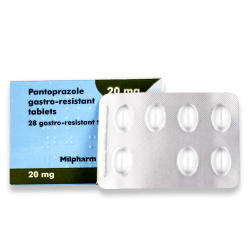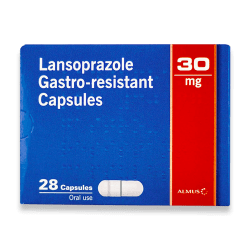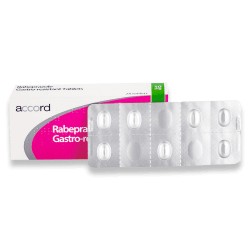Login to your account
- Prescription included
- Genuine medication
- All-inclusive service - No hidden fees
- Free next-day delivery
Acid reflux and heartburn
Get acid reflux medication with an online prescription
Acid reflux is a common condition caused by acid from the stomach travelling up to the throat. It is usually characterised by heartburn, a burning feeling in the chest. Chronic acid reflux is called gastroesophageal reflux disease (GORD), known as GERD in other parts of the world.
Acid reflux treatment can help alleviate uncomfortable symptoms such as heartburn and indigestions. You can buy clinically proven medication online from euroClinix.
On this page
What is acid reflux? What causes acid reflux? Who is more at risk of getting acid reflux? What are the symptoms of acid reflux? How is acid reflux diagnosed? How can I treat acid reflux? How can I prevent acid reflux? What are the complications of not treating it? How do I buy treatment online?Available Treatment(s)

- Effective treatment of acid reflux
- Reduces stomach acid
- Easy-to-take capsules

- Effectively relieves heartburn and acid reflux
- Prevents and heals stomach ulcers
- Reduces stomach acid for lasting relief

- Effectively relieves acid reflux
- Available in 2 strengths
- Convenient oral formulation
What is acid reflux?
Acid reflux is a condition that causes heartburn, often experienced as a burning or tightening sensation in the chest. Symptoms vary between people, ranging from mild to severe.
Heartburn is quite common, and not something to worry about if it only happens occasionally, but if you find that it happens more than once a week, or your symptoms are particularly severe, you should seek medical advice. This is most likely a condition known as GORD (gastro-oesophageal reflux disease). GORD involves a reflux of other stomach contents, as well as stomach acid, including bile and pepsin which both play a role in digestion. Over time, this condition, if left untreated, can damage the oesophagus and lead to more serious health concerns.
What causes acid reflux?
This condition is caused by stomach acid rising out of the stomach and into the oesophagus.
During the process of digestion, a sphincter (valve) at the bottom of the oesophagus, called the lower oesophageal sphincter (LES), opens to let swallowed food pass through to the stomach. After food has passed through, it closes, and cells in the stomach release acid to digest the food.
When somebody has acid reflux, the LES does not work as it should, and the acid that is meant to stay in the stomach rises up into the oesophagus. This causes inflammation and heartburn.
The occasional bout of acid reflux is caused by indigestion, a term used to describe general stomach upset, often caused by eating a large meal or lying down too soon after eating. However, recurrent acid reflux and GORD are caused by several factors including lifestyle, underlying conditions or medications. This causes the LES to relax and weaken over time, which increases the frequency and amount of acid that leaks into the oesophagus.
Can acid reflux be caused by other conditions?
It’s important to get any recurrent symptoms checked, as acid reflux can be a symptom of several other conditions. Acid reflux is the main symptom of a hiatal hernia where the top of the stomach bulges into the diaphragm (the muscle that separates your abdomen from your chest). Some connective tissue disorders including scleroderma, lupus and rheumatoid arthritis, as well as other gastrointestinal conditions including gastroparesis (slow emptying of the stomach) can all cause acid reflux.
Who is more at risk of getting acid reflux?
Acid reflux is common in pregnancy and obesity due to the excess pressure on the stomach, from excess weight and infant growth, which forces stomach acid into the oesophagus. Pregnant women also experience hormonal changes that have been linked to acid reflux.
Smoking is also a risk factor for acid reflux because the nicotine in cigarettes relaxes the LES, meaning acid can more easily travel up the oesophagus.
If you take medication for other conditions such as painkillers, certain medications for high blood pressure, antidepressants or certain antibiotics, you may also be more at risk of getting acid reflux as a side effect.
What are the symptoms of acid reflux?
Heartburn, a burning sensation in the middle of the chest behind the breast bone, is often the main symptom. It may be confused for other causes of chest pain including heart attacks (angina), but those conditions may cause constriction and tightness in the chest rather than a burning feeling.
Other common symptoms can include:
- a cough
- regurgitation of stomach acids or food
- a sour taste in the mouth
- bad breath
- hiccups
- bloating and belching
- regurgitation (feeling of bringing up acid or food)
If you have GORD, these symptoms tend to be more severe and persistent, including:
- a chronic cough
- difficulty or pain when swallowing
- sore throat
- hoarseness
- a lump in your throat
- nausea and/or vomiting
- tooth decay
How is acid reflux diagnosed?
Short-term bouts of acid reflux don’t need diagnosis. However, if your symptoms are more complicated or difficult to treat, your doctor may recommend you have some more diagnostic tests done.
You may require an endoscopy, where a tiny camera is passed down your throat to check for inflammation. They may also take a biopsy, a small sample of cells, from your oesophagus lining if they find anything abnormal. Another diagnostic test for GORD is pH monitoring of your oesophagus. Monitoring lasts over 24 hours and involves a small probe being placed in your oesophagus through your nostril, and is connected to a wireless device to record the occurrence symptoms as well as when you eat or lie down.
You may also require a series of specialist X-ray tests of your digestive system to rule out any other conditions that may be causing your reflux. This group of tests is known as a UGI (upper gastrointestinal) series. It is designed to check for abnormalities in your oesophagus, stomach and in the first part of your small intestine (duodenum), made visible by swallowing a liquid suspension such as barium.
How can I treat acid reflux?
Symptoms can be treated with a combination of lifestyle changes and medication.
Over-the-counter medications
There are some treatment options that are available to buy over-the-counter at pharmacies including antacids, alginates, and proton-pump inhibitors (PPIs).
Antacids provide quick relief by neutralising stomach acid, but do not treat the underlying cause in more complex cases. Alginates produce a coating which protects your oesophagus from stomach acid. Low-dose PPIs work by reducing stomach acid, but are recommended for short-term use only.
If you need to use these medications quite frequently, or they become less effective, your GP may advise that you take a prescription medication.
Prescription medications
PPIs and H2 receptor antagonists (H2 blockers) are two prescription medications commonly prescribed for acid reflux. They both work similarly in that they reduce stomach acid production, but they target different cells in the stomach lining.
Commonly prescribed PPIs available for purchase at euroClinix are Omeprazole, Lansoprazole, Nexium, Esomeprazole, Rabeprazole and Pantoprazole. They all work the same way, but differ in how long they last for and how your liver breaks them down.
Your doctor will decide which medication is most suitable for you depending on your condition and medical history.
Surgery
If you find that prescription medications do not help with persistent symptoms, you may be referred to a gastroenterologist to discuss surgical options which may include:
- fundoplication - procedure that raises pressure on the lower oesophagus by winding the top of your stomach around the LES, which tightens the muscle and prevents reflux
- stretta procedure - low-radiofrequency heat used to reshape the LES, performed via a small tube inserted down the oesophagus
- LINX surgery - a band of magnetic titanium beads is wrapped around the place where your stomach and oesophagus meet, where the magnetic attraction keeps the LES loose enough to let food through but tight enough to stop reflux
How can I prevent acid reflux?
As well as medication, there are some lifestyle changes you can make to prevent and reduce acid reflux symptoms.
- eating smaller, evenly spaced meals
- eating slowly
- drinking plenty of water
- wearing clothes that fit loosely around the waist
- waiting a few hours after eating before laying down or going to bed
- raising the head of your bed
- losing weight (if you’re overweight)
- quitting smoking
Should I avoid certain foods if I have acid reflux?
Some people find that certain foods will trigger symptoms. Keeping a food diary can help you identify and avoid these triggers, as well as improve your digestive health overall.
Common trigger foods include:
- fatty foods
- spicy foods
- citrus fruits
- tomatoes
- garlic and onions
- alcohol
- coffee or tea
- carbonated beverages
These foods have all been found to relax the LES or have a high acidity content (such as citrus fruits and tomatoes), which increases the risk of acid being able to leak up into the oesophagus.
Does milk help acid reflux?
Although milk has long been heralded as a remedy for symptoms of heartburn and acid reflux, it is unclear if it is actually effective at providing relief. Some evidence suggests that calcium content and the pH levels in milk may temporarily alleviate heartburn, but the fat and protein in milk may have a negative impact by stimulating the production of stomach acid and relaxing the LES. Plant-based milk, on the other hand, is a healthier alternative. Almond milk has a slightly higher pH level than cow's milk, meaning it may help to neutralise stomach acid.
What are the complications of not treating it?
Whilst occasional episodes of acid reflux are nothing to worry about, untreated recurrent acid reflux can cause other serious complications.
Stomach acid can damage your oesophagus, causing inflammation (oesophagitis), ulcers and tightening (oesophageal stricture). It can also damage your voice box (larynx), a condition known as reflux laryngitis. All of these conditions can be painful and can result in difficulty swallowing and blood loss.
Recurrent acid reflux and GORD have also been linked to a condition known as Barrett's oesophagus. This is where the oesophageal lining is damaged and regrows abnormally. Whilst the condition itself is not fatal, it can lead to oesophageal cancer. As the cells in the oesophagus lining repair themselves, they can become precancerous. It is still incredibly rare, but people with Barrett's will need to be monitored regularly so any abnormal cells can be spotted before it’s serious. If you are experiencing any symptoms such as weight loss, severe pain, nausea, food getting stuck in your throat or your usual medications aren’t working, you should consult a healthcare professional.
How do I buy treatment online?
You can buy several PPIs here at euroClinix including Omeprazole, Lansoprazole, Nexium, Esomeprazole, Rabeprazole and Pantoprazole for the treatment of acid reflux. All you have to do is fill out a short consultation form that will be reviewed by one of our registered doctors. Once they find that you are suitable for treatment, your medication will be dispensed and dispatched by our pharmacy with next-day delivery.
Select
medicationFill out a short
medical formDoctor issues
prescriptionMedication sent
from pharmacy


